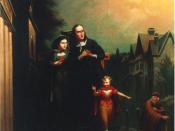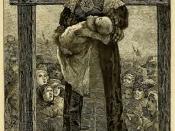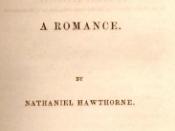The Scarlet Letter
The Scarlet Letter, written in 1850 by Nathaniel Hawthorne, is about a Puritan society in Massachusetts. The theme of this novel is largely sin, and how the guilty parties were not equally treated for the same sin or exposed for the wrong that they had done in the eyes of God. Hawthorne describes deception, the withholding of the truth, and secrecy in the development of the plot and characters in the novel. Hawthorne vividly makes use of symbolism and feminine status in Puritan New England, giving The Scarlet Letter a complex plot.
American transcendentalist Nathaniel Hawthorne was born on July 4, 1804 in Salem, Massachusetts to Elizabeth Manning and Nathaniel Hathorne (Stewart 2). It is said that Hawthorne inherited his father's sternness, moodiness, and desire to stay to himself (3). Hawthorne spent his college years in Maine (13), and married Sophia Peabody in 1842 (62). Hawthorne was once called the "American Shakespeare," by Herman Melville (249).
The use of symbolism by Hawthorne in The Scarlet Letter can first be seen in the prison. The prison may be linked symbolically to the rigorous
enforcement of Puritan laws. Also, Hawthorne refers to Ann Hutchinson, who rebelled against the Puritan beliefs and was imprisoned. Hawthorne describes a rose bush growing outside, and how impossible it was that it should be growing there by saying, "This rose-bush, by a strange chance, has been kept alive in history; but whether it had merely survived out of the stern old wilderness. . . or whether, as the is fair authority for believing, it had sprung up under the footsteps of the sainted Ann Hutchinson, as she entered the prison-door. . ." (Literary Classics of the United States 159). This rose bush is symbolic of passion, and Hester's sin is one of passion. The...



Good Work!
You've sited your info and it is well written, I agree with Hoba on the structure. Good paper though
5 out of 5 people found this comment useful.